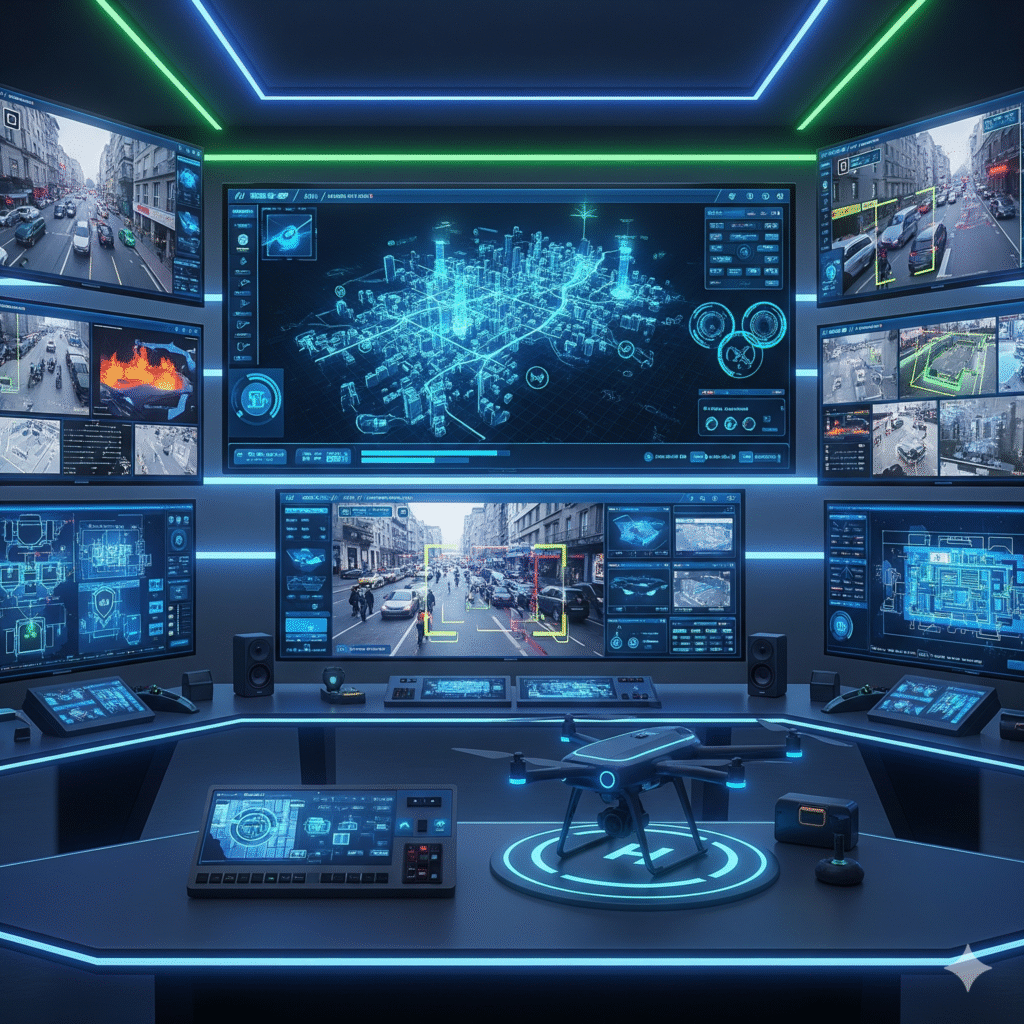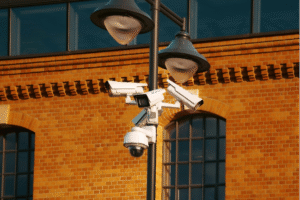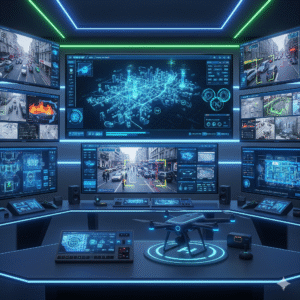Upon obtaining your Texas Security Contractor License, the next step is to educate and prepare your business team for the future of security systems in Texas. In today’s rapidly evolving market, the most important question is: what is your license to compete?
The Texas security industry is being reshaped—not by new regulations, but by transformative technology. Traditional patrol-and-observe models are no longer enough. Clients now demand intelligent, proactive solutions that leverage cutting-edge tools to protect their assets.
To survive and grow, security contractors must adopt and integrate these innovations. This isn’t about chasing trends—it’s about upgrading services to meet modern threats and rising client expectations.
Here are five critical technology shifts every Texas security contractor must master to future-proof their business.
1. The AI-Powered Analyst: From Watching to Predicting
For decades, the core of many security contracts has been video surveillance: a guard watching a bank of monitors, waiting for something to happen. That paradigm is over. The industry is moving from passive “video surveillance” to proactive “visual intelligence,” and Artificial Intelligence (AI) is the engine driving this change.
Modern AI-powered analytic systems do more than just record footage. They analyze it in real-time to identify patterns, anomalies, and potential threats before they escalate. These systems can:
- Differentiate and Classify: An AI can distinguish between a stray animal, shifting shadows, and a person attempting to scale a fence, dramatically reducing the flood of false alarms that plague traditional motion-detection systems.
- Perform Behavioral Analysis: Advanced algorithms can identify suspicious behaviors, such as an individual loitering near a secure entrance or a vehicle circling a parking garage, and automatically alert personnel to a potential risk.
- Automate Event Detection: AI can be trained to instantly recognize specific events, from the presence of a weapon to a crowd surge at a public venue, enabling a faster and more effective response.
The Texas Advantage: Imagine bidding on a contract for a high-end commercial property in Houston or a luxury retail center in Dallas. Instead of just offering hourly patrols, you can propose a premium “Predictive Threat Monitoring” service. By leveraging AI, you offer a solution that doesn’t just respond to break-ins but helps prevent them, justifying a higher contract value and setting you apart from competitors who are still just selling manpower.
2. The View from Above: Integrating Autonomous Drones
For contractors responsible for securing large areas—sprawling industrial parks in East Texas, expansive corporate campuses in Austin, or large-scale residential communities in the DFW metroplex—ground patrols have inherent limitations. Autonomous security drones are rapidly emerging as a powerful and efficient force multiplier.
A modern security drone is far more than a hobbyist’s toy. These are sophisticated unmanned aerial vehicles (UAVs) equipped with high-resolution cameras, thermal imaging for night operations, and advanced sensors. They can be programmed to conduct autonomous patrols, respond automatically to alarm triggers, and provide invaluable aerial reconnaissance during an active incident. One drone can cover a perimeter in a fraction of the time it would take a vehicle patrol, providing unparalleled situational awareness to the officers on the ground.
The Texas Advantage: Offering drone surveillance as a service is a massive market differentiator. It demonstrates a commitment to innovation and provides a tangible, high-value service that few competitors can match. A “Drone as a First Responder” (DFR) program, where a drone is automatically dispatched to an alarm location to provide real-time video before officers arrive, can drastically improve response times and officer safety. This requires investment in equipment and proper FAA Part 107 certification for your operators, but the return on investment comes in the form of premium service contracts and a reputation as a technology leader.
3. The Unified Command Center: Cloud and System Integration
As your business grows to manage multiple client sites across Texas, operational efficiency becomes paramount. The days of relying on disparate, on-premise systems for each location are numbered. The industry is rapidly adopting hybrid-cloud platforms that allow you to monitor and manage all your clients’ security operations from a single, centralized command center.
This trend goes beyond just video. True unification involves integrating all facets of a client’s security into one cohesive ecosystem:
- Access Control: Manage permissions, monitor entry points, and receive alerts.
- Video Surveillance: View live feeds and review recorded incidents.
- Intrusion Detection: Monitor alarm panels and sensors.
- Intercom Systems: Communicate with personnel and visitors remotely.
By bringing these systems together on a single platform, you can offer your clients a “single pane of glass” view of their entire security posture. This simplifies management, automates workflows, and provides a level of insight that siloed systems simply cannot match.
The Texas Advantage: Consider a client with a chain of retail stores from El Paso to Beaumont. By implementing a unified cloud platform, you can offer them a managed security service where your team monitors all their locations from a central hub. This increases your operational efficiency and provides immense value to the client, making your service stickier and more integrated into their daily operations.
4. The Evolving Officer: Upskilling Your Human Capital
Technology is a powerful tool, but it is not a replacement for skilled human professionals. In fact, as technology becomes more sophisticated, the demands on your security officers increase. The role is evolving from a physical deterrent to a tech-enabled “guardian” who must interpret data, manage systems, and make critical decisions.
A guard who cannot operate the VMS, interpret an AI-generated alert, or understand the data from a drone feed is a liability, not an asset. Your most valuable investment is not in hardware, but in the ongoing training of your team. High employee turnover is a major challenge in the security industry, and one of the key drivers is a lack of professional development and engagement.
The Texas Advantage: Your Texas Security Contractor License is the starting line, not the finish line. As a business owner, you must invest in post-licensing, technology-focused training for your officers. This includes training on the specific software platforms you use, basic data analysis, and customer service protocols for interacting with advanced systems. A well-trained, tech-proficient team is your single greatest competitive advantage. They will deliver better service, feel more valued in their roles, and be the key to winning and retaining the sophisticated clients who are embracing this new era of security.
5. The Cyber-Physical Frontier: Securing More Than Just the Door
As physical security systems like cameras, access control readers, and alarm panels become network-connected devices, they inherit the vulnerabilities of the digital world. Every IP camera is an IoT device, and every network-connected door controller is a potential entry point for a cyberattack. The convergence of physical and cybersecurity is no longer a theoretical concept; it is a critical operational reality.
A security contractor who installs a state-of-the-art surveillance system without considering its cybersecurity posture—using default passwords, failing to segment the network, or neglecting software updates—is not just installing a security solution; they are creating a massive vulnerability. A breach of the security system can lead to a complete compromise of the client’s network, data, and privacy.
The Texas Advantage: Understanding and mitigating basic cyber risks is now a professional responsibility for every security contractor. You don’t need to be a cybersecurity expert, but you do need to practice good cyber hygiene and be able to speak intelligently with your clients about the risks. This includes implementing strong password policies, ensuring systems are properly configured, and working with a client’s IT department to ensure security devices are installed safely on their network. Ignoring this cyber-physical frontier is a significant liability for your business and your clients.
Build Your Blueprint for the Future
With a Texas Security Contractor License, you have the authority to operate. With License for Security, you stay compliant. With technology, you gain the power to compete—and win.
The five trends outlined above—AI, drones, unified platforms, personnel upskilling, and cyber-physical security—are not distant possibilities; they are becoming the foundational pillars of the modern security business.
Your license is the foundation. Now it’s time to build the future. Licensed to operate. Backed by compliance. Powered to compete.





